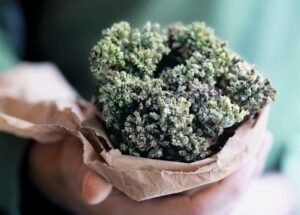Following a balanced diet is the first step to healthy, strong hair. However, enhancing certain micronutrients and foods to prevent hair loss is essential during periods of increased hair loss.
The truth is that nutrient deficiency is often behind many types of diffuse alopecia.
A low-calorie diet and malnutrition can cause excessive hair loss between one and six months after the onset.
Thus, people who follow a very demanding or inadequate weight loss plan may experience significant hair loss within a short period.
Another example of this relationship between diet and hair loss is the deterioration that hair often suffers in people with eating disorders such as anorexia and bulimia.
Iron deficiency alopecia is a relatively common disorder – especially among women – and is caused by a deficiency of this mineral.
Beyond iron, the lack of certain vitamins, trace elements, and amino acids is also related to hair loss.
Specifically, zinc, magnesium, L-cystine, pantothenic acid (vitamin B5), vitamin B6, and biotin (vitamin B7).
The best way to ensure an adequate supply of these micronutrients is through a healthy and varied diet.
However, sometimes it is necessary to use hair loss supplements specifically designed for this type of alopecia that maintain these nutrients at optimal levels.
Hair supplements are especially indicated if other external factors can contribute to or exacerbate hair loss due to malnutrition.
For example, hair loss due to stress – periods in which it is also common to neglect our diet – or after very physically demanding events.
The latter can range from a high fever due to an infection to a very demanding sporting competition, such as a marathon, to a surgical procedure.
This hair loss is usually especially worrying and causes a lot of discomfort when it is associated with an underlying alopecia, such as scarring alopecia, alopecia areata, or the most common, androgenetic alopecia.
When we talk about hair loss, we usually associate it only with hair loss.
However, eyebrow alopecia and eyelash alopecia can also be a symptoms of nutritional deficiencies.
Nutrients and foods to strengthen hair
Once the relationship between diet and hair loss is established , the first step is to incorporate changes in the diet and increase the consumption of those vitamins, trace elements and amino acids that will contribute to strengthening the hair .
In this sense, the best foods for hair loss are those that include the following macro and micronutrients.
- Proteins. Following a protein-poor diet leads to impaired collagen and connective tissue production, affecting hair health. Including different protein sources ensures a varied supply of amino acids, essential for maintaining healthy hair and preventing hair loss. It’s worth remembering that the body needs amino acids to produce proteins. The main foods for strengthening hair and preventing hair loss within this group are meat, dairy products, nuts, and legumes.
- Vitamin C. This vitamin is essential for the production of collagen, a protein present in the natural structure of hair, which gives it strength. It’s also essential for the absorption of iron, a key mineral for hair health, which contains high doses of vitamin C is good for hair. These include red peppers, citrus fruits, tomatoes, broccoli, and green leafy vegetables.
- Vitamin A. In addition to being a great antioxidant, vitamin A promotes the formation of sebum, a substance essential for moisturizing the scalp and maintaining healthy hair. The main foods rich in vitamin A for strengthening hair are spinach, dairy products, liver, and vegetables containing beta-carotene, such as carrots and cantaloupe.
- B vitamins. One of the main symptoms of B vitamin deficiency is hair loss. A deficiency is also linked to skin problems and the appearance of brittle nails (and can even cause hair loss ). Within this group, the main foods for strengthening hair are those that contain pantothenic acid, vitamin B6, and/or biotin. Almost all foods of plant and animal origin contain pantothenic acid, the most notable being meat, avocado, broccoli, eggs, milk, mushrooms (especially Chinese or shiitake mushrooms), and cereals. As for vitamin B6, interesting foods for hair include tuna, salmon, bananas, legumes, poultry, potatoes, and other starchy foods. Biotin is found mainly in meat, fish, eggs, organ meats, seeds, nuts, sweet potatoes, spinach, and broccoli. Other relevant hair-strengthening foods include folic acid and vitamin B12. Folic acid is found primarily in dark green leafy vegetables, legumes, and citrus fruits. Vitamin B12, on the other hand, can be found in organ meats, seafood, meat, eggs, and milk.
The best foods for hair are those rich in protein, vitamins A, C, and B, iron, zinc, and magnesium.
- Iron. This mineral plays a key role in hair follicle activity. Specifically, it participates in energy metabolism, oxygenation, proliferation, and hair growth. For this reason, when there is an iron deficiency, the hair growth cycle is altered, resulting in significant hair loss. The main sources of iron, and therefore the best foods to strengthen hair and prevent hair loss, are: red meat, legumes, nuts, dried fruits, and fortified cereals. It is worth mentioning that people with iron deficiency often also have deficiencies of zinc, biotin, and vitamin B12.
- Zinc. A large portion of this mineral is found in the skin, hair, and nails, as it participates in the synthesis of keratin. This protein makes up 80% of hair and plays a key role in its appearance. Hair rich in keratin will be shinier, more elastic, and stronger. As a result, one of the first symptoms of zinc deficiency is often impaired hair growth. Furthermore, in androgenetic alopecia, a lack of this mineral can worsen hair loss. Therefore, it’s a good idea to include zinc-rich foods in your diet for hair. Among the most interesting are oysters, meat, fish, seafood, and fortified cereals.
- Magnesium. This mineral is essential for protein synthesis, which is essential for healthy hair. Foods rich in magnesium include legumes, nuts, seeds, whole grains, and green leafy vegetables.
- L-cysteine. Sulfur-containing amino acids like L-cysteine play a very important antioxidant role and exert a protective effect on cell membranes against various aggressions. L -cysteine is also a constituent of keratin, the main component of hair. These types of amino acids are not essential. That is, the body can produce them as long as it has the necessary nutrients, primarily proteins from animal sources. To achieve this, a sufficiently varied diet that includes different types of foods is essential. In this sense, people following a low-calorie diet, vegans, or vegetarians are at greater risk of suffering from an L-cysteine deficiency, as are older adults. Beyond meat, eggs, and milk, other important sources of L-cysteine are garlic, onions, and leeks.
Making dietary changes and increasing the presence of these nutrients is essential to strengthen hair and prevent hair loss due to malnutrition.
At the same time, hair supplements can help achieve adequate levels of vitamins, minerals, and amino acids more effectively and quickly, especially when hair loss is significant and more immediate action is required.























+ There are no comments
Add yours